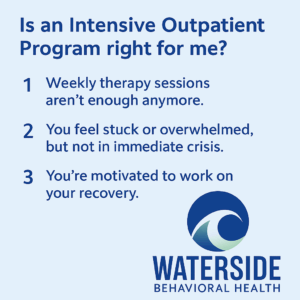Maybe you meant to skip just one day. Maybe life got heavy, or weird, or you just didn’t feel like going. One missed session turned into two… then you stopped answering texts. And now, it’s been a while.
If you dropped out of an Intensive Outpatient Program (IOP), ghosted the process, or just faded out without saying goodbye—you’re not alone. It happens more than people talk about.
And here’s what you need to know:
You can come back.
You don’t need to explain yourself perfectly. You don’t need to be “doing better.” You just have to be willing to reach out again.
Let’s talk about what that looks like—and why this could be your next right step, not a repeat of the past.
1. Dropping Out Doesn’t Make You a Flake—It Makes You Human
Real life doesn’t always move in neat, clinical timelines.
You might’ve left IOP because:
- Your job changed, and the schedule didn’t work
- You felt too anxious or overwhelmed to keep showing up
- A specific group or dynamic didn’t feel like a fit
- You weren’t ready for that level of honesty or vulnerability
- Your depression or anxiety made even trying feel like too much
All of that is valid. None of that disqualifies you.
Most people who ghost treatment don’t do it because they don’t care—they do it because something got too heavy. And when life gets that heavy, sometimes ghosting is the only move your nervous system has left.
2. You Haven’t Lost Progress—You’ve Just Been Paused
This is the fear that stops most people from returning to IOP: “I’ve undone everything I worked for.”
But here’s the truth:
Healing isn’t a straight line. It’s a spiral. And you’re not back at the beginning—you’re just walking a familiar part of the path with more perspective than last time.
Coming back to IOP isn’t about “fixing” what went wrong. It’s about reconnecting with the support that helped in the first place—only now, you know more about what you need.
3. You Don’t Need a Perfect Excuse—Just a Willing Heart
If you’re not sure how to start the conversation, here’s a simple script:
“Hey, I know I ghosted. But I think I’m ready to talk about coming back.”
That’s it. You don’t need a dramatic backstory. You don’t need to apologize 20 times. You just need to show up.
At Waterside Behavioral Health in Plymouth County, we’ve seen people return after days, weeks, even years. No lectures. No shame. Just a welcome back.
4. You Can Be Honest About What Didn’t Work Last Time
Maybe it was the schedule. Maybe the group didn’t feel right. Maybe you felt lost in the mix.
You’re allowed to say that.
Rejoining IOP doesn’t mean pretending it was perfect—it means getting honest about what might need to shift.
Waterside’s Intensive Outpatient Program (IOP) is flexible. We’ll work with you to adjust what we can so that it fits better this time around.
5. Expect a Re-Entry—Not a Reset
Coming back to IOP usually involves a check-in or reassessment, but don’t worry—it’s not a test.
We just want to meet you where you are now so we can support you the way you actually need. You might:
- Rejoin your previous group
- Step into a different track
- Adjust your goals or schedule
It’s not about starting over. It’s about starting fresh—with more self-awareness and more space for what’s real.

6. Rejoining Might Feel Weird at First. That’s Okay.
It’s normal to feel awkward. Maybe even embarrassed.
But here’s the thing: you’re not coming back as someone who failed. You’re coming back as someone who cares enough to keep trying.
That’s a strength—not a shortcoming.
Your return isn’t a red flag. It’s a green light for healing. And every single person on our team knows what it means to step back in after stepping out.
FAQs: Returning to an Intensive Outpatient Program (IOP)
Is it okay to come back if I ghosted without notice?
Yes. It happens. No one at Waterside will guilt-trip you. We’re just glad you reached out again.
Do I have to start all over again?
No. You’ll reconnect through a reassessment or intake update, but we’ll work from where you are—not where you were.
What if I’m not sure I can commit fully this time either?
That’s okay. Let’s talk about what feels doable. Partial re-entry, schedule tweaks—those are conversations we’re open to having. The goal is progress, not perfection.
What if I left because I was overwhelmed or anxious in group settings?
You’re not the only one. Let us know what felt hard—we can explore different group fits, prep supports, or individual options to ease the transition.
Is IOP only for people in crisis?
Not at all. Our IOP supports people in many different stages—coming out of a tough patch, looking for maintenance care, or stepping down from a higher level of support.
The Door Is Still Open—Whenever You’re Ready
Call 774-619-7750 or visit our Intensive Outpatient Program IOP page to talk about restarting care at Waterside Behavioral Health in Plymouth County, MA.
You don’t need to explain it all. You just need to reach out. And we’ll meet you with warmth, not judgment.




